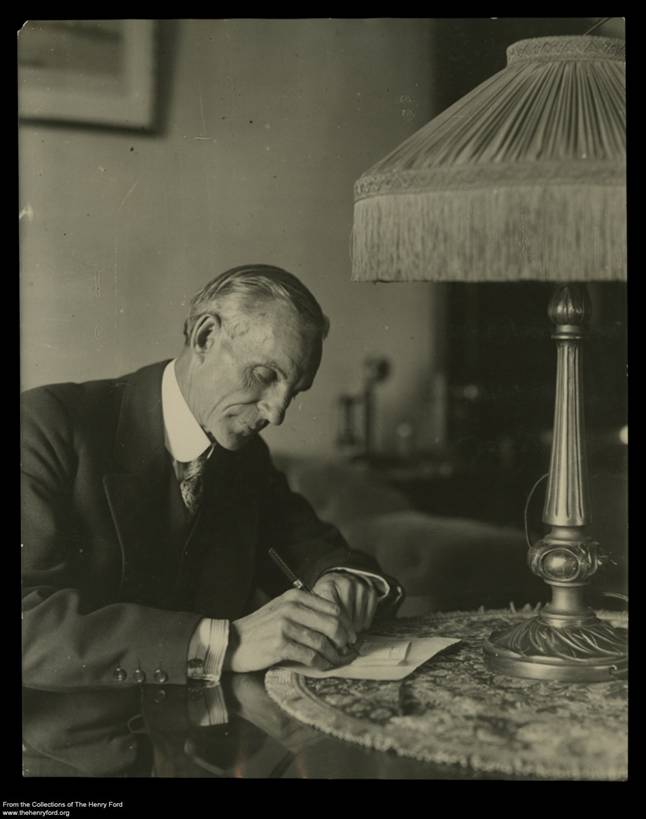Henry Ford’s Quotations

Henry Ford's achievements, which revolutionized both industry and society, made him a folk hero. His unique and colorful personality helped cement his legend. A study in contrasts, he possessed an original mind and was a strong intuitive thinker, but had a distrust of formal learning and little personal education. Although he shrank from public speaking, he came to relish publicity.

Because of his immense popularity and notoriety during his lifetime and since, numerous sayings have been ascribed to Henry Ford. Many of these sound plausible but are incorrect, and some can’t be traced to him at all. Too often, a quote is attributed to Ford simply because its touches upon success in business or innovation: He has become a patron saint of the entrepreneur, a Paul Bunyan of the business world. One of the more popular of these quotations is, "If I had asked my customers what they wanted they would have said a faster horse," which has never been satisfactorily traced to Henry Ford. In fact, the quote only begins to appear in the early 21st century, "quoted" by modern-day business gurus using it as an object lesson, whereas germs of its main idea can be directly sourced to other speakers through the late mid to later 20th century. (See more at the Quote Investigator.)
Compounding the problem of misattribution is what could best be described as the unclear origin of legitimate Henry Ford quotes. As mentioned, Ford had a strong aversion to public speaking. Nervous in front of crowds, he opened up and even sparkled in smaller settings. (Known for avoiding the press, he would grant the rare interview to a changing circle of select reporters.) Moreover, the rough-hewn Henry Ford was no writer, and hence relied on helpers to prepare published materials. Among his ghostwriters were two longtime, trusted staff members: his executive secretary, Ernest G. Liebold; and his publicist, William J. Cameron. Joining them was the journalist Samuel Crowther, who was the prolific ghostwriter of three Henry Ford memoirs (My Life and Work, Today and Tomorrow, and Moving Forward). Crowther spent considerable time with Ford and proved adept at presenting the magnate's ideas for publication.
As a result of the foregoing complexity, many of the quotations attributed to Henry Ford in common circulation today prove at best problematic to verify or challenge.
Work on collecting and authenticating Henry Ford quotations was begun by Ford Motor Company staff in the Ford Motor Company Engineering Library—possibly as early as the mid-1920s. (The library, housed in Ford’s Engineering Department, maintained files on a wide variety of subjects of interest to or about Henry Ford.) A longtime Ford Engineering librarian, Rachel MacDonald, assembled the quotations into a collection, the Henry and Edsel Ford Quotations collection. This collection was later transferred to the Ford Motor Company Archives, in 1955. While we do not know the exact date MacDonald started her research, records indicate that she was at Ford Motor Company at least as early as 1940 (but no earlier than 1936) and up through the transfer of the collection to Ford Motor Company Archives. What we don't know is whether the collection was started before or after Henry Ford's death (or, consequently, how much input Ford himself had in verifying the quotations). The Henry Ford received the collection in 1964 as part of a much larger donation of Ford Motor Company records. Staff, interns, and volunteers of the Benson Ford Research Center at The Henry Ford have continued work to authenticate Henry Ford quotes, resulting in this publicly accessible list.

The collection includes quotations that have been traced to a primary source or a reliable secondary source. Examples of reliable secondary sources would be a published interview with Henry Ford or other direct quotations of Henry Ford in newspapers contemporary to him, including but not limited to publications such as the Ford Times and Ford News. A book whose ghostwriting or collaboration was authorized by Henry Ford also falls under this category. Among the primary sources drawn on are Henry Ford's own "jot books," or personal notebooks, found in two different archival collections. These notebooks, few in number, provide a good example of Henry Ford's writing style and interests. If you are searching for a quote and do not see it on our list, it means that staff was not able to trace it to a reliable source.
So many of the unverified quotations are now out in the world and on the web that it is no small challenge to track and verify them. Quotations like the “faster horse” quip, as well as other maxims like the one illustrated below appear on a variety of products, including coasters, mugs, and T-shirts. These quotations and their use speak volumes to a natural human tendency to use legendary figures and a historical lens to illustrate the ideas and trends relevant for our time.
If you have questions or comments about the Henry Ford quotations page, please contact the Benson Ford Research Center at research [dot] center [at] thehenryford.org.
Rebecca Bizonet is former Archivist at The Henry Ford.


Facebook Comments